DAVE'S DIARY - 18 DECEMBER 2012 - JOHN ANDERSON
1983
INTERVIEW
JOHN ANDERSON - STILL SWINGING
"She had so many hard knocks/ she don't play the jukebox/ she's lived all those sad songs first hand/ what's made her so bitter/ and why love has quit her/ is because she has loved the wrong man." - The Girl At The End of The Bar - John Anderson-Lionel Delmore.
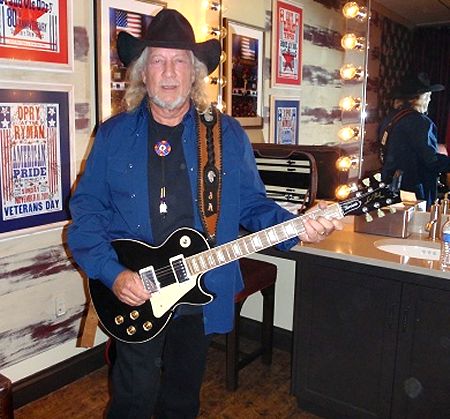 |
The first
time I interviewed John Anderson was in the back of his tour bus outside
famed Fort Worth cowboy bar Billy Bob's.
Billy Bob's is the biggest honky tonk in the world with 42 bars and live
bull-riding ring.
It was the summer of 1983 and the stone hillbilly singer was 12 years
into a career that has now lasted 41 years.
That was an era when I was paid to write about country music for mainstream
print media and even sold interviews to 4KQ in Brisbane and 2KY Sydney.
I was in Fort Worth to cover the International Country Music Festival
for Sydney Daily Mirror, Adelaide News and music magazines.
Luckily, the next interview five years later was in the bright lights
of John's then label MCA in Nashville.
Well, it's now 41 years since the latter day Tennessean arrived in Nashville
in 1971 in a beat up Volkswagen.
When he hit Music City he toiled as a 17-year old tiler building the roof
of Opryland in the blazing heat.
Anderson was born in Orlando, raised in small town Apopka and has lived
at Smithville near Nashville for more than 30 years.
But it was back in central Florida in the sixties that he debuted with
first band The Living End - well before the Aussie rock band of same name.
"We played an awful lot of Top 40, rock'n roll," Anderson told
me.
"By the time I was 15 I heard a Merle Haggard record - Merle Haggard's
Greatest Hits. At that time it really got my attention. I thought
this was more what I was looking for. This is really music I can sink
my teeth into. This means something to me as I came from pretty down to
earth people. My mum and my dad were good hard working folks. We were
a close family - four sisters and one brother.
He joined his sister Donna in a duo in 1972, was discovered by singer
Wild Bill Emerson and joined Wild Bill when he cut three singles on Earl
Richards Ace Of Hearts label - Swoop Down Sweet Jesus, Losing Again
and A Heartbreak Ago.
Sisters Donna and Deeanna and Anderson's third wife Jamie have sung on
many of his albums.
During the 1983 bus interview the acclaimed new traditionalist revealed
that after major success a bootleg album surfaced.
"There were singles on the Ace Of Hearts label and a bootleg album,"
Anderson told me of a disc that surfaced here in import shops as Back
Tracks.
"I have seen a couple of different versions of that album. One of
the band members found it in a Walmart. I said gosh, you're kidding. We
recorded them a long time ago. They were some of my first experiences
in the studio. Maybe it's a good thing there are out on tape.
After all it's the music that really matters."
THE GIRL AT THE END OF THE BAR
"If
you'd ever been drinking/ I know that you'd seen her/ at the end of the
bar all alone/
She knows what you're thinking/ When you try to approach her/ and anything
you say might be wrong." - The Girl At The End Of The Bar - John
Anderson-Lionel Delmore.
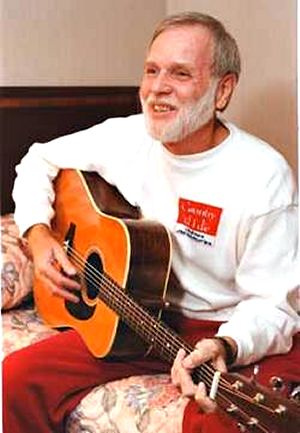 |
Anderson
signed with Warner Brothers in 1977 and hit with The Girl At The
End Of The Bar. "After that we had a song called Low Dog Blues that was written by Lionel Delmore and myself," Anderson recalled. "Then came Lying Blue Eyes which even kicked us more. By this time mid 1979 things were rolling pretty good." Anderson also discussed the sources of his original songs including Swingin' - penned with Lionel Delmore who died at 62 in 2002. "I remember looking up to Lionel and saying this could be a smash but it is so silly," Anderson told me. "We have to work on it and make sure it's not too silly. I hate to use this word but it still has to be cute. This was our genuine all American junior high school puppy love affair." <Lionel Delmore |
Another big
hit was 1959 - not to be mistaken with the Lee Kernaghan song.
"1959 has been a big favourite here ever since we done it,"
Anderson explained.
"What I wouldn't give is a chance to go to Australia and play it."
Since then Randy Travis scored with another song called 1982.
"Randy has really done well, the songs are completely different but
I appreciate your jest there," Anderson joked.
"I saw Randy last night. I've known Randy for a long time. He has
always been really intense about his music. I could tell when I met Randy
his first love was his music. It's good to see for someone who has been
as enormously successful as he has."
BILLY JOE SHAVER
"Hey
I'm just an old chunk of coal/ but I'm gonna be a diamond some day/ I'm
gonna grow and glow till I'm so blue pure perfect/ I'm gonna put a smile
on everybody's face
I'm gonna kneel and pray every day." - I'm Just an old Chunk Of
Coal - Billy Joe Shaver.
Anderson
recalled the first time he heard Billy Joe Shaver's I'm Just An Old
Chunk Of Coal (But I'm Gonna Be A Diamond Someday.)
"Billy Joe's publishing company sent it to my office and we played
it and really liked it and did it straight away," Anderson revealed.
"Since I recorded the song a lot of other people cut it. Stonewall
Jackson has a video out of the song. Gospel groups have done it - there's
a gospel connotation to it. I think that was one of biggest selling points
to me - I always thought it was a very spiritual song."
Anderson and Shaver united more than three decades later in 2007 to record
Shaver song Get Thee Get Behind Me Satan for Billy Joe gospel disc
Everybody's Brother, produced by John Carter Cash.
We will feature their animated hot gospel video later in Series #19 of
Nu Country TV.
ROBERT ALTMAN AND PAUL KENNERLEY - BLACK SHEEP
"My daddy was a brakeman on a high ball travelling train/ and mama she raised four little children and our family had a good name/ and papa and mama wanted all for us they never had/ big brother, little brother, sister too/ no they didn't turn out half bad, except me/ I'm the black sheep of the family." - Black Sheep - Danny Darst-Robert Altman
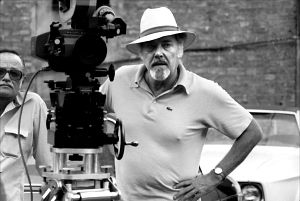 |
What
about his then Black Sheep whose writers included Robert
Altman - director of the iconic 1975 Nashville movie - who
died at 81 in 2006. < Robert Altmann |
"It was the first time I had heard from him in about three years. It was a great follow-up to Swingin.' I thought we were really coming in rockabilly mode there. I thought it was time for a little rockabilly in the country scene - maybe we were early but it did work for us. We did take a little flack - people thought we were trying to change. Between that and Swingin' they thought we were completely trying to get away from our country music. We'll always try to find and record the great country songs that are so vital in my style of music. If we didn't have the ballads like I Just Came Home To Count The Memories or Down In Tennessee, those kind of songs, there would be a part of me that be would really feel left out."
SWINGING WITH LIONEL DELMORE
"There's a little girl in our neighborhood/ her name is Charlotte Johnson and she's really lookin' good/ I had to go and see her so I called her on the phone/ I walked over to her house and this was going on/ her brother was on the sofa, eatin' chocolate pie/ her Mama was in the kitchen cuttin' chicken up to fry/ her daddy was in the backyard rollin' up a garden hose/ I was on the porch with Charlotte, feelin' love down to my toes/ and we were swingin'." - Swingin' - John Anderson-Lionel Delmore
Anderson
dedicated a latter 2002 compilation disc Anthology to deceased writing
partner Delmore with whom he wrote his big hit Swingin, Bend It Until
It Breaks and 30 other songs he recorded.
"Swingin' has been our biggest record," Anderson added.
"There have been more questions asked about Swingin' - especially
who wrote that song?
It's really a great feeling to kick back and say 'I did." Me and
Lionel Delmore wrote it.
Songwriting is very, very important - the creative end of it is to me
the most important aspect of it."
So how did Swingin' come about?
"Actually, we both had decided to quit our day jobs. He said 'you
know, either we're gonna be songwriters or we're gonna go ahead with these
jobs we've got.' I was working in a little store, and Lionel was making
keys for a living. We both decided to quit our jobs the same day and start
writing songs together.
And of course Lionel comes from a wonderful music background, the Delmore
Brothers.
They're Country Music Hall of Famers and should be. His father was Alton
Delmore - one of the most prolific and greatest songwriters I've ever
come across, and I think he passed a lot of that down to Lionel. And,
in turn, Lionel passed a lot of that to me. I know that I probably wouldn't
be half the writer I am had it not been for Lionel just being so insistent
with me."
1988 INTERVIEW
FRED CARTER JR AND PAUL KENNERLEY
"Oh, I got me a woman she's a pretty good woman at that/ we live with a monkey and a Chinese acrobat/ she calls me Tex, makes me wear a cowboy hat/ but I don't care she's a pretty good woman at that/ nothing in the world make me treat that woman mean/ she shaves my beard and she keeps my tractor clean/ she burns my bread, makes me turn green/ but I don't care she's a best little woman I've seen." - I Got Me A Woman - Paul Kennerley.
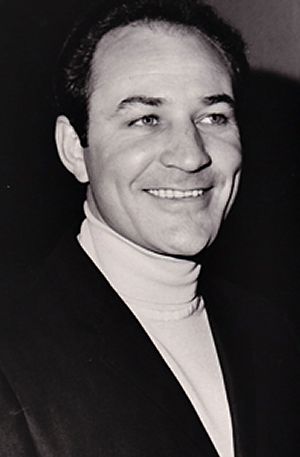 |
Anderson
had fond memories of the eclectic 1983 album All The People Are
Talkin'. Anderson
also wrote It's Hard To Keep This Ship Together with Fred
for 1987 album Blue Skies Again. |
"Fred
and I hunt and fish together. Fred helped take me under my wings when
I first moved to Nashville. Fred just moved down to Louisiana back to
his home. I'm really missing him.
We wrote that song - knew it would take off real big or not at all. Here
it didn't really take off - didn't seem successful at radio at all."
All The People Are Talking included Look What Followed Me Home
- penned by Mark Sherrill and Oklahoma raised Becky Hobbs who toured
Australia with Kacey Jones in 2008 and played a Nu Country TV concert
at The Noise Bar in Brunswick.
Anderson resurrected Things Ain't Been The Same Around The Farm
- penned with Ace Of Hearts artist Wild Bill Emerson.
The singer also scored widespread airplay with 1985 album Tokyo, Oklahoma.
"My good friend Paul Kennerley (ex-husband of Emmylou Harris) wrote
I Got Me A Woman for me," Anderson revealed of the song on
Tokyo, Oklahoma.
"He's written some great hits - most of The Judds No 1s. He wrote
some other songs that we did - Take That Woman Away on our 1984
album Eye of The Hurricane. It was a nice rockabilly type thing
with a little twist to it. We thought that was country music needed at
the time."
DOWN IN THE ORANGE GROVE
"Well, the big freeze came, now the trees are all gone/ down in the orange grove/ they cleared the land and they've built new homes/ then the canker hit back in 84/ down in the orange grove/ now there's shopping malls and grocery stores." - Down In The Orange Grove - John Anderson-Herb McCullough-Lionel Delmore.
Anderson
had just released album 10 - featuring seven of his originals - at the
time of our 1988 interview.
"I was very fortunate to have some time for writing prior to this
album," he confided.
"This point in my life, the older I get, the more I see this writing
is very important - especially for someone like me. I have my own style
I have developed through the years.
The writing point is very crucial - I was very proud of this album due
to that. The songs worked out well."
Down In The Orange Grove had roots in the state that produced The
Bellamy Brothers and was home to late Gary Stewart in his latter years.
"It is a bit autobiographical," Anderson said.
"A fellow named Herb McCullough got with Lionel and gave him this
idea. He's from Florida and co-wrote Down In The Orange Grove.
He said 'if you don't mind Herb I'd like to carry this idea to John because
I have been down to his home and I know that's exactly where he's from.
My first reaction was why haven't I thought of this before now. Here's
this song so close to home and it's someone else's idea. Herb's a Florida
boy so it made sense so we sat down and wrote the song. It really is so
true to what has happened down there in the last few years. It's a song
about the growth and the changes, industry moving in to central Florida
as it has moved in everywhere in the last 10 or 12 years. We can't hold
progress back but there's nothing to stop us having memories of how it
used to be when things weren't quite the same as they are now. Being able
to remember and go back to that is a really nice experience."
Anderson also wrote the ballad I Hope Things Aren't Like This Tomorrow
with Delmore.
"There are very spiritual overtones in the song," Anderson confessed.
"I think to some it up when people are having a real bad day they
hope things aren't like this tomorrow."
BERNIE TAUPIN
"Well the bank job wasn't easy/ no, they left a couple dead/ and when the headlines hit the stands that day/ it was Zero and the tramp, they said/ now it looks like they've got a manhunt for a couple of crazy kid." - The Ballad Of Zero And The Tramp - John Anderson-Bernie Taupin
Anderson also teamed with Bernie Taupin - lyricist for Sir Elton John in his halcyon era - for their collaboration on The Ballad Of Zero And The Tramp."To be able to collaborate with Bernie and just to met with him and talk with him was a great experience for me," Anderson revealed.
"I feel like Bernie is one of the premiere songwriters of our age with songs that are going to here forever. To be able to have written a song with someone like that is a wonderful compliment to someone like me at my stage of the business. The way we met - I heard Bernie was a country music fan and he knew I was into his music. We got together and became acquainted and then collaborated on the song. I look forward to doing some more with Bernie. I hope folks like Zero & The Tramp because it's one of my favourite songs on there. Bernie has loved country since he was a young boy. I found that very interesting."
GEORGE BUSH SNR
"If it ain't broke don't fix it/ if it's mixed don't try to mix it/ think before you speak/ and look before you leap." - If It Ain't Broke Don't Fix It - John Anderson-Tony Stampley.
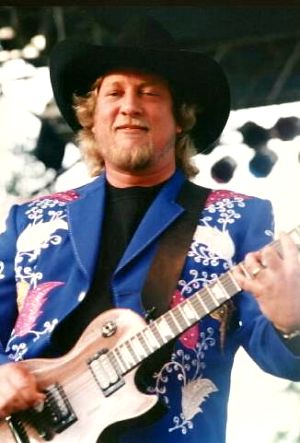 |
Anderson
also wrote If It Ain't Broke Don't Fix It - often used in political
campaigns - with Tony Stampley. "Tony Stampley and I were on the road," Anderson recalled. "Tony is a fine songwriter around Nashville. His daddy, a lot of the folks in Australia may know, is Joe Stampley - a very great country singer. (Joe and Moe Bandy recorded as Moe & Joe.) Tony and I wrote this song and lo and behold we got a call from the Republican Party and Vice President Bush wanted to use the song on his campaign for President of the United States. We rewrote the song and they're using it and I'm pulling for them all the way. Bush is a real country fan. I was a supporter of George before the song came about. I heard that he like country music so why not be a little prejudiced." So how did Anderson cope with fame from such a young age? "There may have been instances when it almost got a little over our heads," Anderson confided. |
"You're out on the road and you are working 200 days a year for really energetic crowds and your records are at the top of the charts. It's real easy to get wrapped up in all of that. Since that in the last couple of years I've had a chance to step back from that and taking a look and writing these songs. The album John Anderson 10 is a product of that - a self move."
MEL MCDANIEL
"There's people standing with their hands out, forming a welfare line/ savin' their back while I'm out breakin' mine/ I ain't worried about the federal budget or the LA city smog/ I'm workin' overtime and eatin' lower on the hog." - Lower On The Hog - Lionel Delmore-Larry Cordle.
Anderson
also cut Lower On The Hog - also recorded by late Oklahoma singer
Mel McDaniel.
"I didn't know Mel had a version until right before going in the
studio and recording the song," Anderson confessed.
"Gosh, I'm sure his version is great. How I got the song was Lionel
is the writer on it. Lionel and I are like brothers but he didn't tell
me Mel had also recorded it. People say to me 'John, that song really
speaks to working class people. That's what we want to say."
The co-writer on the song was Larry Cordle - also co-write of George Strait-Alan
Jackson music industry parody hit Murder On Music Row.
Ironically, the prolific songwriter has regrets about passing on another
song that became a big hit for McDaniel.
"The biggest one would be Baby's Got Her Blue Jeans On,"
Anderson revealed.
"The song came to us, and I had a lot of songs of my own at the time
that I was wanting to get done. So that was part of the reason for us
not doing so much outside material at the time. So we passed on the song,
but my buddy Mel McDaniel had a huge hit on the song. Later on, I was
at this party at MCA, and Conway Twitty was there. He came over to me
and said, 'How come you didn't do that song I had them send over to you?'
I said, 'What song was that? I never knew you sent a song, sir.' He said,
'That song, Baby's Got Her Blue Jeans On. He said, 'They sent it
to me first, and I told them you were the one that needed to record that
song.'
You know, if I had known that Conway had sent it over, it probably would
have made a difference. I was a huge Conway Twitty fan. I still am."
SONGS FOR WIVES AND DAUGHTERS
"I used
to think flowers would not grow for me/ and my dreams would never come
true/ I used to chase rainbows and not find the gold/ but that was before
I met you." - Before I Met You - John Anderson-Lionel Delmore.
Anderson
wrote Just For You - with third wife Jamie Rebeka - for his 1987
album Blue Skies Again.
"Yes, she is my third wife and we're really doing great," Anderson
said proudly of his singing spouse with whom he shares his happiness on
a 140 acre farm at Smithville east of Nashville.
"I've never been happier. That was out first collaboration actually
writing a song and as you say more or less the opposite of the sad and
sorrow aspect of things. It's a real happy day around the house and that's
where things like this come from. This was just a simple little love song.
We just sat down and wrote it together. We wrote it nearly a year and
half ago at our house up in Smithville. I have a little office there where
I do a lot of my writing in. It seems to work for me. It was a working
farm but I choose not to work it.
I have an awful lot of deer and a lot of wildlife around the house. In
my spare time what I enjoy the most is being outdoors hunting and fishing.
It's a real hot spot here for hunting and fishing. It's a beautiful rural
area with lot of really friendly people and very conducive to the songs
we wrote and the music we play."
Anderson and Delmore also wrote Before I Met You about their wives.
"It's definitely very personal," Anderson confessed.
"I'm very proud of it since Lionel and I wrote it. We tell the girls
- our wives Jamie and Susan - we wrote it for them. That always helps
things."
He also Just To Hold A Little Hand about his eldest daughter -
Brionna.
"My little girl Brionna inspired that," said Anderson who has
a second daughter Alexa.
"It's for people to grow up and never experience children around
the house would be such a loss. That's what that song is saying, the innocence
and happiness, looks in their eyes - the freshness of a child's mind.
It's very precious. You don't often get a chance to get down and be that
personal, soft you might think. I thought it was appropriate - all our
children are precious and I think that pretty much speaks for itself.
I only have one little girl - Brionna."
WAYLON JENNINGS
"We're all polyester poets and pickers of a kind/ with far too many questions for the answers in our minds/ stranded in the middle but all is black and white/ somewhere between ragged and right/ we're a gang of drug store cowboys/ with silver spurs and leather vests Hillbilly Casanovas, fastest guitars in the West/ we're trackin' down a system, spoilin' for a fight." - Somewhere Between Ragged And Right - Waylon Jennings- Roger Murrah.
Anderson also recorded a duet with the late Waylon Jennings on Somewhere Between Ragged and Right - penned by Jennings and Roger Murrah.
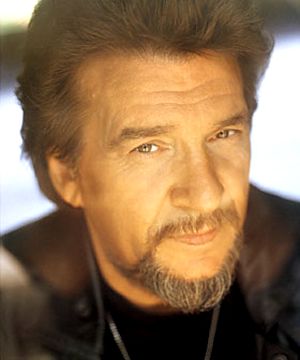 |
"That
was one of my favourites, working with Waylon was a big thrill for
me," the singer revealed. "Waylon was one of the reasons I decided to settle in Nashville and pursue this kind of music - influences of people like Waylon Jennings and the very early Johnny Paycheck. When I say the early Johnny Paycheck I mean the sixties when he recorded Don't Take Her, She's All I Got. Merle Haggard at that time was in Bakersfield but I didn't know. I thought it was all in Nashville. Waylon is a big force in what country music has come to today. I feel sure of that. His greatness will speak for itself as it always has in my opinion - and to be able to work with him and say you are on record with Waylon Jennings if you are a country singer it is indeed a big thrill." |
Anderson
also recorded I Make It Hard To Lose, penned by Mark Germino who
wrote the corporate radio parody Rex Bob Lowenstein.
"Mark Germino is a fine writer," Anderson revealed.
"He's had an album or two out now. He's very original and a fine
writer. I found this song and it had this twist. It lured us in and we
did it."
So how did the tight radio formats parodied by Germino impact on Anderson
in 1988?
"We've had difficulty through the last two or three years attaining
the top of the charts," he explained.
"In regions all through the south we maintain our consistency. We're
on an upswing with If It Ain't Broke. Also the Orange Grove.
Things are very cyclical."
RUSSELL SMITH
"There's
a light at the end of the tunnel/ there's a chance that it ain't gonna
rain/ there's a light at the end of the tunnel/ and for once it ain't
a fast moving train." - Light At The End Of The Tunnel - Don Cook-Keith
Whitley.
Anderson also recorded Quitting Time - penned by Amazing Rhythm
Aces singer Russell Smith, John Jarrard and Ben Dover.
"I'm a big fan of Russell's singing with the Amazing Rhythm Aces,"
Anderson said.
"I went to see them in concert here in Nashville once. I always loved
the job he did on Third Rate Romance. It was a great record - it
was a great pleasure to do one of his songs."
A trip to Colorado inspired There's Nothing Left For Me To Take For
Granted.
"It's very personal and very spiritual," he said.
"The idea came many years ago," Anderson recalled.
"Lionel Delmore and I were driving to a job. At the time I didn't
have a band at all. We got this idea - we were driving into Colorado.
We could see the mountains in the distance and we were working on this
song. It took about eight or nine years to finally decide how to finish
it."
And Light At The End Of The Tunnel - penned by late Kentucky born
country-bluegrass legend Keith Whitley who died at 34 on May 9,1989, with
a blood alcohol level of .477% less than a year after this interview?
"That song was written by Keith Whitley, a good friend of Don Cook,"
Anderson said of the Kentucky born singer - one of Lorrie Morgan's former
husbands.
"Keith is doing great these days - he's a great singer and a great
writer. This song did mean something to me personal. One of the few songs
you say I wish I had written that. I do feel there is a light at the end
of the tunnel, not only in my case but in anybody's case. Maybe going
through frustrating times and trying to deal with their career or whatever
they may do in life - it's always a good thing to stand up and smile about
it and be happy about it."
That was then and this is now.
BIGGER HANDS
"The lights are out and rent's past due/ I really missed her paycheck too/ maybe I should go downtown/ get me a job and settle down/ then again I reckon that I'll just sit here/ with my cold coffee and hot beer." - Cold Coffee And Hot Beer - John Anderson.
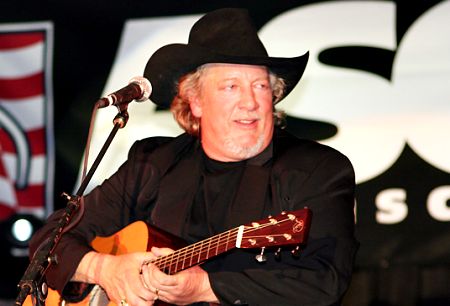 |
Anderson
celebrated his 58th birthday on December 13 after he reunited with longtime
producer James Stroud on 30TH album Bigger Hands.
The project was released in 2009 on Country Crossing Records - a division
of Stroud's new label, Stroudavarious Records.
The first single and video was Cold Coffee and Hot Beer.
"I've got a whole gospel album that we finished that I'll probably
be putting out before too long myself," Anderson says.
In 2002 Anderson, renowned as the ghost of the late Lefty Frizzell, released
a 30 track double CD Anthology (Audium-Shock).
The singer re-recorded the cream of his music from 21 albums on five different
labels to avoid ownership disputes so they could all be on one release.
He included Billy Joe's I'm An Old Chunk Of Coal, Frizzell's Love
You A Thousand Ways, You're Lying Blue Eyes and Bobby Braddock's George
Jones tribute Would You Catch A Fallen Star.
John used his road band on classics 1959, She Just Started Liking Cheatin'
Songs, I Just Came Home To Count The Memories, Chicken Truck and self
penned Seminole Wind.
In 2007 Collectors Choice also re-released five re-mastered albums recorded
for Warner Bros in the eighties.
They were I Just Came Home to Count the Memories, All the People Are
Talkin', Eye of a Hurricane, Tokyo, Oklahoma and Countrified.
His nineties hits included Straight Tequila Night in 1991 and another
string of top 10 hits including Let Go of the Stone, Seminole Wind,
When it Comes to You and Money in the Bank.
WEEDS
"And I don't wanna hear how your times are hard/ I got to pull the weeds from my own backyard/ I'm sitting here and drowning in my sorrow/ I hope things aren't like this tomorrow." - Weeds - John Anderson-Lionel Delmore.
Anderson
and Lionel Delmore also co-wrote Weeds from John Rich produced
2007 Easy Money CD.
"Lionel Delmore was one of the most important people to me ever in
my career as far as advising me and staying on me about writing songs,"
Anderson revealed.
"When I was a younger man, of course, we had a lot of other things
to go do besides sit down and write. Lionel kept saying, "Man, you
need to sit down and write. You're a good writer and you need to develop
that. One day your songwriting might pull you out of a hole if you ever
happen to get there." Well, indeed, I got there, a couple times.
And I'll say this: God bless ol' Lionel. He was right. My songwriting
pulled me out of the hole just about every time. And it looks it might
pull me out of the hole again."
So how long did Weeds take to sprout?
"Well, I originally had the idea for Weeds several years back,"
Anderson explained.
"It seemed it just needed readdressing, and Lionel and I got together
on the song and, of course, it's a mournful thing. "I hope things
aren't like this tomorrow" is a big part of what it's saying. It's
about this old boy drowning in his sorrow, no doubt. There is this one
line at the end of the song, and it's one of the strongest lines, really,
that I probably ever wrote. It's "I don't wanna hear how your times
are hard/I got to pull the weeds in my own backyard."
Well, there's been a few times for me that it's been just that way. And
I tell you what, anybody that hadn't done it, if you just sit down and
start pulling weeds for about eight hours - it's a pretty big job.
JOHN RICH
"My daddy taught me in this country everyone's the same/ you work hard for your dollar and you never pass the blame/ when it don't go your way/ now I see all these big shots whinin' on my evening news/ they say they're losin' billions and it's up to me and you/ to come runnin' to the rescue." - Shutting Detroit Down - John Anderson-John Rich.
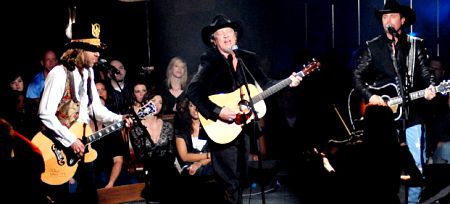 |
Anderson's
collaboration with John Rich of Big & Rich triggered Easy Money.
Anderson and Rich also co-wrote Rich's strident social comment single,
Shuttin' Detroit Down.
The stellar video, featuring Mickey Rourke and Kris Kristofferson, highlighted
a populist message saying the U.S. shouldn't abandon Detroit and American
automobile industry. The song is also a blistering attack on crooked corporate
banksters.
Anderson also recorded a faster version of Detroit on Bigger
Hands.
Hank Williams Jr recorded a sibling song Red White and Pink Slip Blues
- penned by Mark Stephen Jones and Arthur Tower.
Anderson met Rich on a 1996 tour in Sanford, Florida.
"Indeed the Chicken Truck story is true with Brother John Rich,"
Anderson recalled.
"We worked a show together. He was a member of Lonestar back in about
'95. A knock came on the door and a young man said, "I'd like to
meet John Anderson and get a picture with him."
He said "I'm John Rich with Lonestar."
Well, my fiddle player and bandleader, Joe Spivey, opened the door and
said, "Well, are you a fan?"
He said 'Well, sure I am."
Joe said, "Well, sing me a song." I guess he was just trying
to give him a hard time, being in fun, I'm sure. But, anyway, John broke
into Chicken Truck, and after he sang about half of it, I overheard
and said, "Tell him that's good enough. Send him on in." And
little did I know that this man would become, 10 years later, one of the
greatest songwriters and entertainers, as well as record producers. I
must give him full credit on this record for production. He did a great
job.
"I had co-produced or produced every one since the second one, and
I think we're on 27 or 28.
So, as I got in the studio with John, I saw his energy and the things
that were happening and the things he was telling the players. Indeed,
at first we were going to co-produce the album. But after an hour of me
being in the studio, just paying attention and looking, I thought this
might be a great opportunity to just let this young man rock with it and
I'll just worry about the singing and we'll try and make this a good record.
And indeed he did a great job."
MUSIKMAFIA
"Well, pardon me if I don't shed a tear/ but they're sellin' make believe/ and we don't buy that here/ cause in the real world they're shuttin' Detroit down/ while the boss man takes his bonus pay and jets on out of town/ and DC's bailin' out them bankers as the farmers auction ground." - Shutting Detroit Down - John Anderson-John Rich
That all
began in 2005 when Rich invited Anderson to write songs together.
"He and I began to write some songs and talk about writing,"
Anderson says.
"Then when we got a few written, we decided we needed to go into
the studio and put them down, and that's pretty much where the Easy
Money album was born. Once we got in the studio, it seemed to be the
right thing to do to just go ahead and just do a record. We thought we
had good enough songs, so at that point, we decided just to go in and
do the record."
It was on that songwriting trip that Anderson met other members of the
MuzikMafia - the Nashville community of folks like Big & Rich and
Gretchen Wilson.
"We went on a road trip with Big & Rich, actually it was going
to be a writing trip also for us, and Shannon Lawson and James Otto came
out on that trip and of course, Cowboy Troy was out, and I ended up writing
songs with all of them. We had a great time."
At the time, they began work on the album Anderson didn't have a major
label record deal - that lent a relaxed atmosphere to the recording sessions.
"The atmosphere in the studio was great to begin with. It really
was," he says.
"But as it became more evident that we were going to do a record,
then things got definitely serious in the studio."
Pairing of the classic neo-traditionalist Anderson with the iconoclast
leader of country music's freak parade may have seemed an incredible mismatch,
but Anderson didn't encounter anyone who wanted to change his mind.
"Most people were really enthused and seemed to be really interested
in what we were going to do," he says.
Anderson himself felt the relationship was an equal one.
"I think the album well represents both of our styles, and I'm pleased
with the way that it came out. I feel like we made a good record."
"He was very familiar with my music and my style, which made it very
easy for me to work with him. And I'll have to say not only my stuff,
but just country music in general," "You know, John Rich is
a very learned young man about a whole lot of country music. I mean he
can sing you just about every Johnny Horton song, every Roger Miller song.
He's really keyed in to the great writers too and has been. So, he's got
a good handle on what's going on."
WARNER BROS
"Hey,
son, I paid my dues/ worn out my cowboy shoes/ played these old guitar
strings
till I could make 'em sing/ and learn to moan the blues, yeah Lord/ it's
a hard way to make easy money." - Easy Money - John Anderson-Shannon
Lawson-James Otto.
With the
album nearly finished, Anderson and Rich decided to shop it to Music Row.
"It was pretty much finished when Rich started shopping it. Actually
Warner Brothers was the first place he took it, and they liked it well
enough to go ahead and sign us up," Anderson says.
"All that's been very exciting. It was a pleasure to get back with
Warner Brothers as they were the first label I ever had dealings with,
so it was a good thing. None of the same people are there that were there
years ago when I was. But still going back to the label and having them
receive me with such open arms was very kind of them."
The collaboration between the two men is reflected in the songs on the
album.
"He brought some, and I had some. We pretty much went through the
best stuff we had at the time and was picking and choosing among it,"
Anderson says of the process.
"As I recall, all the A&R process, as far as picking material
and all that, was really easy. In fact, John and I did most of that mainly
just in small talk, like, 'hey, what do you think we oughta go in and
cut next?' and we'd mention three or four titles, and he'd say, 'yeah,
those might be good' or 'maybe not this one, but this other one,' and
I'd say 'yeah, that might work.' We were both in agreement on the songs
that we recorded from day one."
BONNIE BLUE
"Bonnie blue, I can smell your Sunday dinners/ Bonnie blue, your magnolias are in bloom/ Bonnie blue, you know you always were a winner/ And remember there is someone here who still loves you/ Bonnie blue, I sure miss you/ Oh bonnie blue, I'm sure missing you." - Bonnie Blue - John Anderson-Cowboy Troy.
One of the most touching songs Bonnie Blue - a sentimental look
at the South - comes from a co-writing session between Anderson and MuzikMafia
member, hick-hop artist Cowboy Troy.
"I think it's a different bag for him. Troy had the idea for the
song, and when he told me about it, I was intrigued by the title, the
idea," Anderson says. "That melody just hit me like some melodies
do, not much different than any of the rest of my songs as far as that,
but Troy and I worked together on it also. It was surprising how much
of the same type little notes we both had written down, you know, it was
really surprising. So we were both pretty much in tune with the lyrics.
Basically it's a song about the Southland with a little bit of reverence."
Anderson took the opportunity to stretch a little on songs like You
Already Know My Love - a laidback conversation between a man and woman
laid on a mellow bed of steel guitar, fiddle and piano which exemplifies
the tone and texture of Anderson's unique vocal delivery.
"That one was a bit different, and John and I both knew the difference
that it was, but it was a different kind of thing that we both liked.
So, we figured we should try this and see how it turns out. Well, it made
the record, so I guess it turned out pretty good, or at least I thought
so," Anderson says. "When I heard it, I could relate to it,
and, of course, I knew right where it was coming from, and it was just
a matter of seeing how it would sound with me doing it. Like I say, that
was just something we had to go in and try, but it seemed to work out."
Easy Money, Funky Country and If Her Loving Don't Kill Me
are propelled by Rich's more rock influenced production.
"The tracks, they're jumped up a little bit but only because of the
sonics, new recording methods that we have," Anderson said.
"I don't think they were approached much differently than some of
that old stuff we did with Black Sheep and Eye of the Hurricane."
WILLIE'S GUITAR
"The whole and old Willie Nelson's guitar/ is just like the one you worn through my heart/ and no one really knows how we've held together so long/ me and old Willie's guitar." - Willie's Guitar - Ray Stephenson.
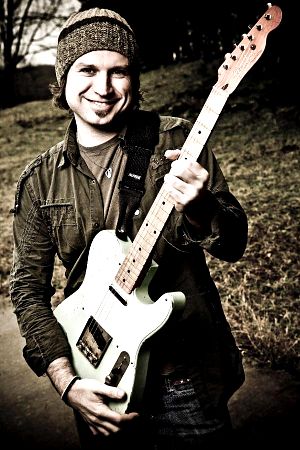 |
Putting
Anderson's vocal style with that of other great stylists is the
song Willie's Guitar compares the hole in the heart of a
broken man to the venerable Martin of Willie Nelson. Other standout tracks are the rollicking Brown Liquor - parody of George Jones' White Lightning and the honky tonker Something To Drink About - not to be confused with Jones' similarly titled I'll Give You Something To Drink About. |
1997
CD REVIEW
JOHN ANDERSON
TAKING THE COUNTRY BACK (MERCURY)
ANDERSON TAKES BACK THE OPRY
"Goin' down to Muscle Shoals/ where the swamp water rhythm flows/ live the only way I know/ I'm just a common man/ headed down to Texas way/ where the honky tonk heroes play/ gonna find that lost highway/ that's where I'll make a stand." Taking The Country Back - Curtis Wright-Marty Stuart.
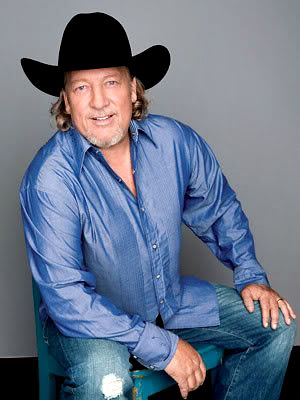 |
When
Floridian singer John Anderson fronted in Nashville in a beat up
Volkswagen in 1971 he toiled as a carpenter on the roof of Opryland. But, like most real country acts, the thrice-wed singer went in and out of fashion with his labels and radio - but not Nu Country FM. |
Now, at the
age of 44, the thrice-wed latter day Tennessean has nailed it with his
20th disc, Takin' The Country Back.
The title track, penned by his little mates Marty Stuart and Curtis Wright,
enables Anderson to ram home the message that he's the real deal on the
cold shoulders - not the middle of the lost highway.
SMALL TOWN
"That rich young widow keeps talking to the preacher/ Lord help their souls be saved/ and Mr Johnson's daughter flew in from Nevada/ when they pout him in his grave/ Tommy took a summer job in Pontiac/ he's still writing letters but he's not coming back/ I'm easy to be found/ it's a small town." - Small Town - John Anderson-Gary Scruggs.
Sadly his
first three singles - the Bob McDill penned Somebody Slap Me and
his co-writes on South Moon Under and the evocative Small Town
- barely dented the charts and the album peaked at 19 in an 18-week
reign.
Perhaps Mercury will bite the bullet and release the title track as the
fourth single and reveal why he's a revved up reincarnation of Lefty Frizzell
with a liberal lacing of Merle Haggard and George Jones.
Anderson runs a steak house in adoptive hometown Smithville when not touring
or hanging out with Chief James Billie of the Seminole tribe.
The eclectic set includes the ballad Sarah, penned with Dave Colwell
of Bad Company, and I Used To Love Her by Kent Robbins who died
at 50 on December 27, 1996, in a car wreck in Clanton, Alabama.